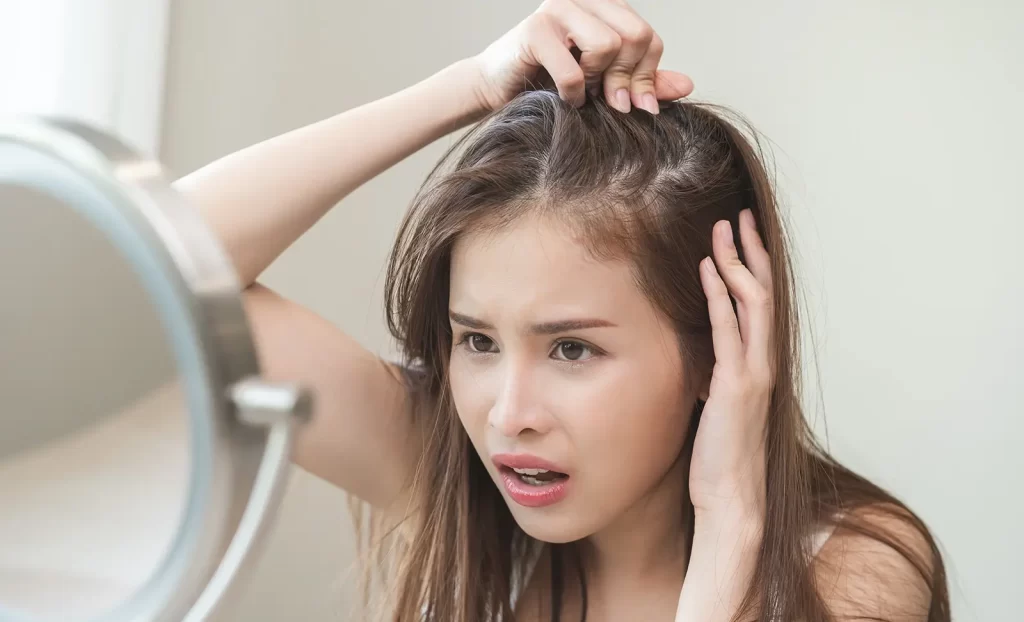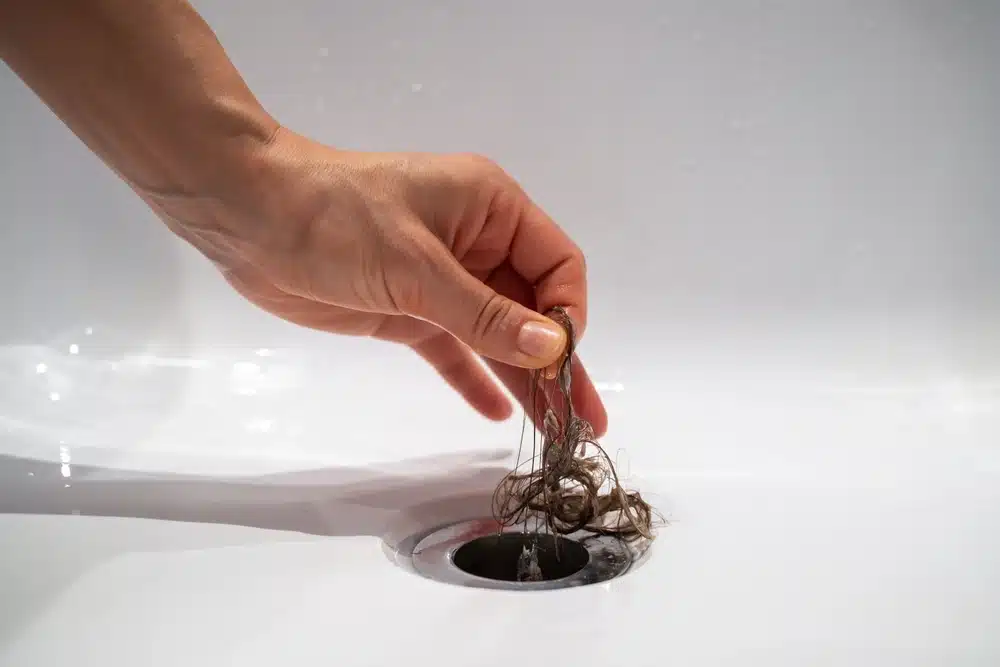Iron deficiencies are common. They produce a range of symptoms that can impact your daily life. So, what about your hair – does iron deficiency cause hair loss? In this article, learn all about iron deficiencies and their potential impact on your ability to grow a full head of hair.
About Iron Deficiencies
An iron deficiency is how it sounds – a body that doesn’t have enough iron in the blood. Iron is essential; it is a natural mineral that helps the body make haemoglobin, which, in turn, carries oxygen all around the body and to the lungs. Plus, it helps with your immune system, hormone production, and growth/development. All in all, it’s pretty important!
Most people get enough iron from their regular diet, with foods such as red meat, nuts, dark greens, and legumes all being high in the stuff. However, that doesn’t include everyone, and some people are more at risk of iron deficiency than others. For example, menstruating women, pregnant women, and children are more likely to have an iron deficiency than others. Iron deficiencies can also occur in people with certain conditions, such as inflammatory bowel disease and celiac disease. Major surgeries may also lead to iron deficiencies in patients.
An iron deficiency may also be referred to as anaemia. However, there is a slight difference – anaemia is a condition where the body doesn’t produce enough haemoglobin. Iron deficiencies can lead to anaemia, but that’s not always the case.
The Signs of an Iron Deficiency
It’s important to be aware of an iron deficiency so you can look out for it and seek treatment when needed:
- Fatigue
- Pale Skin
- Heart Palpitations
- A Sore Tongue
- Sores on the Side of Mouth
- Craving Ice
- Headaches
- Shortness of Breath
- Dizziness
- Cold Hands and Feet
- Brittle Nails
- Dry Hair and Skin
So, Can Iron Deficiency Cause Hair Loss?
Yes – iron deficiency hair loss is possible, although it’s not easy to pinpoint exactly why. One reason is telogen effluvium, a type of hair loss that gets triggered by intense stress on the body, which can occur with an iron deficiency. Another reason is that iron is responsible for carrying oxygen around the body, and if the hair follicles don’t receive enough oxygen and blood flow, hair growth could be disrupted.
Treating an Iron Deficiency
If you have an iron deficiency that’s causing hair loss (and other symptoms) it’s essential to treat it as soon as you can, as it could worsen.
Iron Supplements
The most common way to treat an iron deficiency is by taking iron supplements. You can get some over the counter, but it’s best to get a prescription from your doctor. There are several types of iron supplements your doctor may prescribe, including ferrous gluconate, ferrous fumarate, or ferrous sulphate.
Eating Foods Rich in Iron
You can increase iron levels in your body by eating more iron-rich foods. The good news is there are lots of different foods that contain iron, so whether you are a meat-eater, gluten-free, a vegetarian, or a vegan, there are foods you can incorporate into your diet to increase your iron levels:
- Leafy Greens
- Fish
- Red Meat
- Liver
- Legumes
- Iron-fortified Cereals
- Dried Fruits
- Seafood
- Nuts and Seeds
Increasing Vitamin C Intake
Vitamin C helps your body absorb more iron, so it’s best to incorporate more vitamin C into your diet while boosting iron levels. You can take a vitamin C supplement, or you can focus on eating more vitamin C-rich foods such as broccoli, citrus fruits, tomatoes, potatoes, and peppers.
Monitoring Iron Levels
If you have an iron deficiency or anaemia, you should have your iron levels monitored regularly at the doctor’s. That way, you can see what works at increasing your iron levels (and what doesn’t). If you have hair loss caused by an iron deficiency, you could also use a hair track app to monitor your hair growth after taking iron supplements.
While maintaining a balanced diet is enough for most people, these iron deficiency treatments are essential for anyone low in iron.
How to Know if Your Hair Loss is Caused by an Iron Deficiency
You might find that treating an iron deficiency doesn’t lead to hair regrowth. So, how do you know if you have iron deficiency hair loss, or if your hair is falling out for another reason entirely? The best way to see if you have an iron deficiency is to go to the doctor, as they will perform the necessary blood tests to check how much iron is in your blood. This is the only real way to know if you have an iron deficiency – you should never guess, as many common symptoms of iron deficiency overlap with other conditions.
Should You Take an Iron Supplement for Hair Loss?
You should only take an iron supplement if you genuinely have an iron deficiency. It’s not just because it would be a waste of time and money, but too much iron can also make you ill. These are the symptoms of taking too much iron when your body doesn’t need it:
- Fatigue
- Abdominal Pain
- Period Loss
- Decreased Sex Drive
- Joint Pain
- Irregular Heartbeat
Treating Hair Loss Caused by an Iron Deficiency
If you have experienced iron deficiency hair loss, you will likely want to know how to regrow your hair. The best method here is to increase your iron levels – we listed how to treat an iron deficiency above. With the right iron supplements or appropriate changes to your diet, your hair should grow back. You could also boost hair growth with some hair oils like rosemary or pumpkin seed.
Is Your Hair Not Growing Back?
Iron deficiencies don’t typically cause permanent hair loss – the hair should grow back when you treat it. If your hair doesn’t grow back, your hair loss may be caused by something else, such as androgenetic alopecia. In this case, you should seek out a hair loss treatment.
Hair Loss Treatment Options
Fortunately, there are plenty of available hair restoration options that can leave you with a full head of hair once more – or, at least, the perception of a full head of hair.
Hair Loss Medications: The most common hair loss medications are minoxidil and finasteride – the former is for both men and women, whereas finasteride is prescription-only and just for men. Minoxidil works by boosting blood flow to the scalp and stimulating healing, whereas finasteride works by preventing the production of DHT, the male hormone that is responsible for male pattern baldness.
Low-Level Light Therapy: Low-level light therapy, LLLT, is a simple process that involves lasers being directed at the scalp to stimulate healing and hair regrowth. It usually takes a couple of sessions to see results, but many people come away with fuller, denser hair.
Platelet-rich Plasma: This is a type of biological therapy that utilises your own blood in scalp injections. The platelets from your blood get concentrated and put in a needle; when injected, the hair follicles benefit from the growth factors, leading to healing and hair regrowth.
Hair Tattooing: Hair tattooing has become increasingly popular over the years. It doesn’t give the appearance of long strands of hair; instead, it’s a technique that uses tiny dots of ink to look like short hair on the scalp. It’s typically sought out by men with short hair and receding hairlines.
Wigs and Hair Pieces: Wigs and hair pieces work by covering the entire scalp or just one area of the scalp. They are pieces of hair you can wear to make it look as though you have a full head of locks. While they must be applied daily to achieve the look, they can look incredible and very natural – especially if you opt for high-quality ones and get them professionally fitted and cut.
Hair Transplants: A hair transplant is a minor surgical procedure that involves taking hair follicles from a dense area of hair growth and transferring them to a balding section. Once those hair follicles take root, they will begin growing all-natural hair. This option is permanent and allows people to grow their hair again, which is why it’s so popular.
Can Iron Deficiency Cause Hair Loss: Final Thoughts
You now know the answer to: does iron deficiency cause hair loss? The answer is that – yes, it can, although not entirely directly. Some people with very low iron levels may find they have thinning hair, which can be solved by taking iron supplements or eating more iron-rich foods. If you suspect you have an iron deficiency, it’s always best to speak to a doctor so you can start the best treatment plan for you.
Are you interested in a hair transplant? If you have experienced hair loss, you don’t have to succumb to it. Get in touch with our friendly experts today to learn more about hair transplants, or check out our patients gallery to view what we have already achieved.





